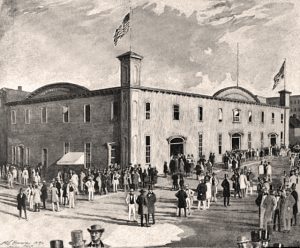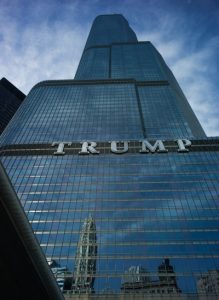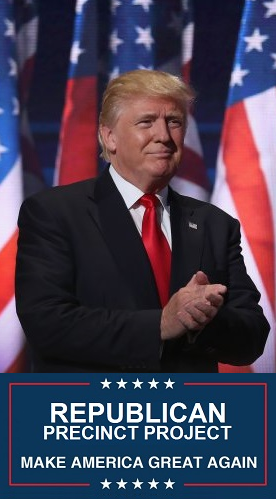By DOUG IBENDAHL • July 11, 2016
“This is essentially a People’s contest. On the side of the Union, it is a struggle for maintaining in the world, that form, and substance of government, whose leading object is, to elevate the condition of men — to lift artificial weights from all shoulders — to clear the paths of laudable pursuit for all — to afford all, an unfettered start, and a fair chance, in the race of life.”
— Abraham Lincoln, July 4, 1861, Message to Congress
Just two blocks from where I live in Chicago, history was made 156 years ago this past May.
The southeast corner of what is now Lake Street and Wacker Drive in the Loop was the site of the Republican National Convention which nominated Abraham Lincoln for President. The Republican Party was just six years old in 1860 and Chicago business leaders hastily constructed an all-wooden structure to attract what was only the second Republican National Convention.

“The Wigwam,” site of the 1860 Republican Convention, Chicago, Illinois, drawing.
Known as the Wigwam, the building was always intended to be temporary, and it sounds like it was a bit of a firetrap. But it served its purpose well that year when well over 10,000 delegates and spectators crammed the facility to the rafters.
Lincoln himself did not travel to Chicago and instead remained in Springfield where he anxiously monitored reports from his operatives via telegraph. Back then it was considered bad form for any potential nominee to be present at the convention.
Lincoln eventually secured the nomination on the third ballot. And before anyone gets any ideas about how that could be a template for next week’s Republican National Convention in Cleveland, remember that in Lincoln’s time there was nothing resembling the state-by-state primary system we have today. Back then the good-old-boys procured delegates in the smoke filled rooms. And I literally mean old boys. America wouldn’t guarantee women the right to vote for another 60 years.
After the convention the Wigwam saw other uses but it soon fell into disrepair. Fire did finally claim the structure in 1867 (four years prior to the Great Chicago Fire). The only hint remaining of the Wigwam and what happened there is a plaque along the sidewalk in front of a modern office tower at 191 N. Wacker Drive, installed when the location was designated a Chicago Landmark in 2002.
We all know what happened after that 1860 convention. Lincoln went on to become one of, if not our greatest President. He freed the slaves, won the Civil War, and saved the Union.
Grateful African-Americans made the Republican Party their home for generations. And across the country, GOP organizations at all levels still strap themselves to Lincoln’s mantle at every opportunity. Here in his home-state the annual Lincoln Day Dinner is often the only fundraising event a county Republican organization has.
So we all know about the lip service. But how is the Party of Lincoln actually doing in the Land of Lincoln when it comes to preserving the leader’s legacy?
Judging by all of the empirical evidence, not so well.
The GOP’s good-old-boys of today would make the good-old-boys back in the Wigwam blush.
It should hardly come as a shock that black voters reward the GOP with paltry support every Election Day. Hispanic participation in the Illinois GOP isn’t much better. And let’s face it, participation in the GOP among white Illinoisans hasn’t exactly been anything to brag about either.
African-Americans didn’t abandon their old Republican Party home in droves just because of the incompetence and corruption of some local-yokel Illinois GOP officials of course. National factors were obviously at work and the missteps go way back.
But my point is, it’s hard to find a Republican official in the Land of Lincoln these days who has the slightest clue how to grow a party. And you wonder sometimes how many party officials raising money on Lincoln’s name today even know what Lincoln stood for (see e.g. the right to vote).
It’s actually even more disturbing than that. It’s not just that the old Boss Hoggs don’t know how to grow a party, many of them have no desire to. Keeping their own title, and whatever perks and privileges can be milked therefrom, is all that matters. Introducing more pesky voters into the equation just means more uncertainty to the small, self-centered mind.
So what does Donald Trump have to do with all of this? A lot.
In our lifetime we have never had a Republican nominee who so gets it about the rigged system. And Mr. Trump is addressing the problem on two levels.
Trump has masterfully attacked the rigged system within the Republican Party, and even better, he does a wonderful job articulating the rigged elements within our global economic system. He hits both themes at pretty much every one of his huge rallies.
Some say Trump is not a free trader. That of course is just one of the lies his unsophisticated enemies spread. In truth Trump does believe in free trade, but it has to be fair trade. Overly complex trade agreements entered into by weak U.S. representatives who got bamboozled at the negotiating table have delivered deals which are disadvantageous to the average American. Trade resulting from these bad deals is neither fair nor free.
Donald Trump literally wrote the book on negotiation. Granted, as President he won’t have the luxury of being able to be at every negotiating table. But hiring is another arena where Trump excels. He’ll bring on the best people and replace the pushovers with tough, seasoned professionals.
It’s all about bringing back jobs and getting America working again. Donald Trump is a builder and he knows how to inspire. From a speech last month:
“Americans are the people that tamed the West, that dug out the Panama Canal, that sent satellites across the solar system, that built the great dams and so much more. Then we really started thinking small. Something happened. Something happened to our mentality. We started thinking small. We stopped believing in what America could do, and became reliant on other countries, other people and other institutions. We lost our sense of purpose and daring. But that’s not who we are.”
Trump is right. America today is pre-occupied with small things like which bathroom to use, or which perceived slight we’re supposed to be offended about this particular week. Meanwhile, journalism has mostly been reduced to millennial reporters combing Trump’s remarks for a word or two which can be cherry-picked out of context and distorted into a click-bait headline.

Trump International Hotel and Tower, Chicago, Illinois.
Trump wants to keep building big things, and that’s a message that resonates with African-Americans and Hispanics as much as with anyone else. He’s pointed out how we could rebuild our inner cities for the money we have squandered in other countries and on bad trade deals. Trump has been refreshingly honest about how his life up to now has been about accumulating wealth for himself and his family. Now at 70 years of age he wants to devote his skills to helping all Americans climb the economic ladder.
Trump knows he can’t compete with Hillary Clinton and the Democrats when it comes to bribing voters with “free” stuff. More importantly, he doesn’t want to. He knows that’s not the answer. He also recognizes how disrespectful and insulting it is to presume that anyone wants to live out their life staying trapped on the Liberal Plantation.
Every election cycle other Republican candidates talk about reaching out to minority communities – but that’s all it’s been, talk. In Mr. Trump we finally have a standard-bearer who can back-up the rhetoric with a proven record of creating thousands of real jobs for men and women of all races and creeds. It’s no wonder Hillary and her media lapdogs are in such a panic.
Just across the river and half-a-dozen blocks down from the site of Lincoln’s nomination is Trump International Hotel and Tower. It’s currently the fourth tallest building in North America and is considerably stronger, safer, and more permanent than the old Wigwam.
The betterment which a Trump Administration will bring to the lives of all Americans left behind and taken-for-granted by the politicians of both parties can be just as strong and permanent.
And in four years Mr. Lincoln might just recognize that party of freedom, opportunity, and inclusiveness which he helped found.
Doug Ibendahl is a Chicago Attorney and a former General Counsel of the Illinois Republican Party.








